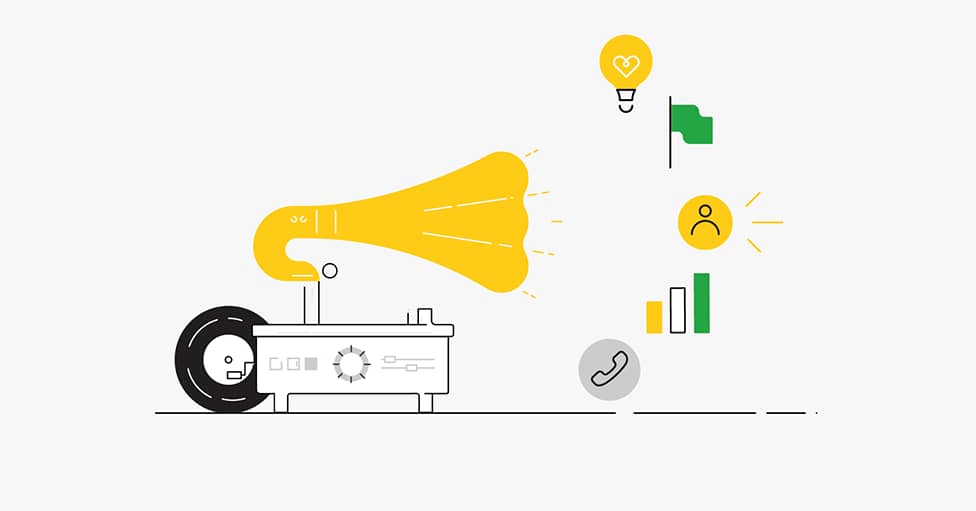The key to understanding your prospects better is to ask the right questions. A good salesperson knows that asking the right discovery sales questions can:
Reveal a prospect’s motivations
Uncover objections before they’re presented
Determine if your solution is a good fit
Build awareness of a need your prospect might not have known they had
In this article, we’ll explore the most important aspects of the sales discovery process and how to ask the right sales discovery questions, which can often determine whether you will win or lose a deal.
What are sales discovery questions?
Sales discovery call questions are the questions a sales professional asks a prospect to determine whether or not their product or service is right for them.
Without the right discovery sales questions, you risk wasting a lot of time on prospects that aren’t a good fit for your solution or simply aren’t ready to make a purchase.
The best discovery questions usually involve open-ended questions about obstacles, challenges and current business processes that relate to what you’re trying to sell.
It’s important not to think of the entire process of discovery as a single event. The best way to use sales discovery questions is to include them early on during the qualifying stage of your sales discovery process before you move forward into sales presentations or product demos.
What is the sales discovery process?
The sales discovery process includes several early steps in the sales pipeline and helps your sales team build a connection with your prospect. It involves six key components:
Researching potential sales prospects in your CRM
Cold calling and connecting with your prospect
Asking your prospect qualifying questions
Answering any questions your prospect may have
Solving your prospect’s biggest challenges
Hopefully moving your prospect to the next stage of the sales funnel
Out of all the steps in the sales discovery process, the sales discovery call is the most important.
This is when you’ll be asking all the important discovery questions to ensure you don’t waste time on a prospect that isn’t a good fit. If they’re not a good fit, you can disqualify them and move on. If they are, there’s a sales opportunity.
Depending on what you sell or who you’re selling to, you could be spending a significant amount of time with your prospect, so it would be wise to use the initial sales call to gauge how likely you are to close the deal and for how much.
This can be easily worked out on the first call by asking the right questions during the discovery sales process.
20 B2B sales discovery questions that every rep can use
Every sales manager and their sales force wants to build strong relationships and close more deals. To do this, successful sales leaders understand that the best questions are open-ended, enabling them to start a conversation and gain a deeper understanding of their prospect’s needs.
Open-ended sales discovery questions are typically questions that can’t be answered with a simple “yes” or “no” answer. Instead, they require that the prospect provide a more in-depth answer that will provide valuable information for you to be able to close the sale.
In general, there are three levels of sales discovery questions that can help you gather the information you need to close the sale through the discovery sales process:
Get to know your prospect
Obtain more background information
Address doubts and concerns
Here are 20 open-ended sales discovery questions that every rep can ask B2B prospects to move them through the pipeline and improve close rates.
B2B sales discovery questions to help you get to know your prospect better:
How are you currently managing your day-to-day processes?
What do you like about your current process?
What would you improve?
What are some of the things stopping you from obtaining your goals?
Sales discovery questions to help you obtain more background information:
What have you done to address your challenges?
What worked with your other solutions and what issues have you had?
How would addressing this challenge with a different process help you?
What does your ideal solution look like?
What would solving your challenge do for your business?
Sales discovery questions to help you address doubts and concerns:
How could a change disrupt your operations?
What are your concerns with changing?
Have you investigated other solutions? What have you found?
What would using our solution look like for your business?
Did I miss any questions or concerns?
Sales discovery questions to help move prospects to the qualified lead stage:
What are the next steps to move forward?
Are there any other decision-makers/stakeholders that should be involved?
Any foreseeable obstacles to doing business together?
What kind of information can I follow up with?
What can I do to help make your decision easier?
Is there anything else I can provide you with to help finalize our partnership?

10 B2C sales discovery questions every sales rep can use
When it comes to the sales discovery process, the same process used for B2B doesn’t work for B2C.
Different discovery call questions need to be used when the target customer is different. Here are some of our recommendations on questions you can ask during a B2C discovery call:
Why are you looking for a new [product/solution]?
Tell me how this [product/solution] compares to your current [product/solution]?
Tell me about any challenges you have with your current [product/solution]?
If this was your [product/solution], what’s the first thing you would do?
How do you see yourself enjoying your new [product/solution]?
What features are you looking for with a new [product/solution]?
How soon are you looking to purchase a new [product/solution]?
Is there anything I can do to make your decision easier?
Have you been looking at another [product/solution]?
What did you like/dislike about the other [product/solution] that you’ve looked at?
The 10 best discovery questions sales reps can use when making a call
A common mistake that inexperienced salespeople make when on a discovery sales call is to immediately dive into selling their product or service. New salespeople often attempt the sale without learning more about who their prospect is, their challenges and needs.
Unfortunately, sticking too closely to scripts and rushing into the sale and pricing often results in prospects dropping off a call early on.
The number one goal of a great discovery call isn’t to plow through your sales pitch, but rather to understand how you can solve your prospect’s biggest problem for them. Figuring out the buyer’s journey starts with asking the right questions.
Here are 10 of the best discovery questions your sales team can incorporate into their cold calling script:
What prompted you to explore our solution?
Tell me about your current solution process?
What would you like to improve about your process?
What would happen if you didn’t do anything to change your process?
If you could wave a magic wand and have everything you wanted in a solution, what would that solution entail? What would you like to automate?
How will picking a new solution impact you?
What matters most to you when picking the best solution?
What is involved in the decision-making process?
Who participates in the decision-making process?
What is your decision-making timeline?
23 unique sales discovery questions
One of the first ways to close a sale is to get to know your prospect. The goal is to find some common ground on a personal or professional level.
This can be done by starting the conversation with questions about books, sports, movies or their family, for example, to build rapport. You could even use their social media profiles (such as LinkedIn or Twitter) to find some common ground. This can certainly help in closing deals.
There are many different types of questions (and follow-up questions) you can ask and chances are you haven’t considered all of them. Here are some unique discovery questions for sales calls that could help nurture trust and create a personal connection with your prospect:
How did you get into [industry, job, hobby, club/group]?
Are you originally from this area?
What do you enjoy most about [industry, job, hobby, club/group]?
I see you’re a fan of [cuisine, sport, event, etc.], what did you think of [latest news, webinars or events]?
Successful salespeople know that timing is everything. Here are some unique sales discovery questions that you can ask to find out if you can provide the right solution now:
What’s the ideal business/team performance for you?
Do you and your team have the resources and time to transition to a new process/solution?
When is your contract up for the solution you have right now?
What will it take to make this happen?
Of course, you want to make the sale, but it’s important that you genuinely care about whether what you’re selling will offer your prospect a solution that truly benefits them.
Doing this involves soft skills like active listening, empathy and asking probing questions as you learn about their pain points, needs and any roadblocks in their way. It’s all about building trust and gaining valuable insights.
Here are some unique discovery sales questions that will help you identify your prospect’s biggest challenges and needs:
What led you to want to make a change now?
Do you measure KPIs or sales metrics, and how often do you achieve those targets?
What matters the most when you’re deciding on the best solution?
What would a percentage jump in performance mean for your business?
What is your vision of a successful outcome?
What is your top priority now?
Don’t assume that you’re the only fish in the pond. There’s a good chance that your prospect is talking to other solution providers.
Here are some unique questions sales organizations can ask to learn how they could resolve their pain points with a solution like yours:
How do you address the pain points you’ve shared?
What positive impact, if any, has the competitor had on your business?
How do we compare with other solutions you’ve investigated?
What do you dislike/like about the competitor’s solution?
What feature/capabilities do you wish you had that the competitor doesn’t?
When you make it through the call, it’s important to get your prospect to the next stage of your sales cycle. Here are some questions that can push forward the purchasing process and get you closer to closing the sale:
When could you and other decision-makers/account executives connect next week?
During our next meeting, what would you like to accomplish?
How can I make it more beneficial and easier for you to decide? (e.g. with a product demo)
What’s the best time to follow up with you on our discussion (later this week, next week, etc.)?
More tips on how to perfect your sales discovery calls
In addition to the effective sales discovery suggestions we’ve presented above, here are some final things to keep in mind when strategizing your sales discovery process and questions to close the sale:
Ask the right number of questions. We recommend sticking to a minimum of 11–14 discovery questions per call.
Less small talk. Open the conversation with small talk, then focus more on big talk, or big questions, which are focused on your prospect’s problems. By doing this, you’re more likely to get to the next step in the sales process and reach a purchase decision.
Timing and consistency. Top salespeople realize the importance of the timing and frequency of questions. They allow time for prospects to ask questions and respond throughout the discovery process.
Address more than one problem. Add more value to what you’re selling by making assessments and looking for ways to help solve more than one of your prospect’s problems. This can help speed up the buying process.
Plan discovery calls wisely. Usually late in the day and early in the week are the ideal times.
Add stories. Use stories that prospects can connect with in your conversation to help increase the chances of your discovery call leading to another call. Ideally, the stories should come near the start of a wrap-up or end of questions.
An example would be a short anecdote about a customer who had a comparable situation that your solution then solved, or a quantifiable success story (case study) where a customer was able to save money or increase their efficiency.Avoid certain questions. Avoid asking closed-ended questions. These are questions that can be answered with a “No” or “Yes” answer. It’s also recommended that you avoid asking a series of questions. You want to ask them one at a time for optimal clarity.
Final thoughts
Not every company’s goals and needs will match the solution you’re selling, and that’s okay. The key is to try to figure this out early on so you waste less time, and save your prospect time too.
By investing time and energy into your sales discovery process and asking effective discovery sales questions, you’ll be better equipped to get a sense of this early on and quickly move on to the potential customers that are a better fit, ultimately ensuring that you exceed your sales quota and become a top performer on your team.













